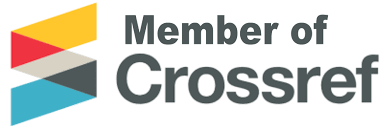Adopsi Inovasi Aplikasi Dompet Digital di Kota Pekanbaru
Abstract
This study aims to determine the adoption of digital wallet application innovations in Pekanbaru City, to describe the cashless society transition in Pekanbaru City. This study uses an innovation-decision process model, namely: (1) knowledge, (2) persuasion, (3) decisions, (4) implementation, and (5) confirmation. This research uses a quantitative approach with a descriptive format. This study chose 120 respondents consisting of generations Y and Z, with the consideration that these two generation groups are adaptive to digital technology. Data collection is conducted from November to December 2019. The results of this study, high knowledge stage score especially indicators of smartphone users who are very active. The score of the persuasion stage is relatively high especially on indicators of complexity of digital wallet applications. The decision stage score is relatively high, especially the aspects of trial and preference for digital wallet applications. At the implementation stage, most respondents had already installed and used the digital wallet application for transaction activities. At the confirmation stage, most adopters intend to continue adoption. In general, the adoption of the digital wallet application has a positive impact, such as ease of transaction, practically, there is cashback, discounts, and more secure.
Keywords
Full Text:
PDFReferences
Abbas, A. E. (2017). Literature Review of a Cashless Society in Indonesia: Evaluating the Progress. International Journal of Innovation, Management and Technology, 8 (3), 193-196.
Arvidsson, N. (2019). Building a Cashless Society: The Swedish Route to the Future of Cash Payments. Springer International Publishing.
Azali, K. (2016). Cashless in Indonesia: Gelling Mobile E-frictions? Journal of Southeast Asian Economies (JSEAE), 33, 364 - 386.
Badan Pusat Statistik. (2018). Profil Generasi Milenial Indonesia Tahun 2018. Jakarta: Kementerian Pemberdayaan Perempuan dan Perlindungan Anak.
Badri, M. (2019). Adopsi Inovasi Aplikasi Trans-portasi Daring pada Generasi Pasca-Milenial di Kota Pekanbaru. Jurnal Penelitian Komunikasi dan Opini Publik, 23(2), 115-128.
Bank Indonesia. (2014). Bank Indonesia Mencanangkan Gerakan Nasional Non Tunai. Retrieved April 27, 2020, from https://www.bi.go.id/id/ruang-media/siaran-pers/pages/sp_165814.aspx
Bungin, B. (2014). Metodologi Penelitian Kuanti-tatif. Jakarta: Kencana.
Devita, V.D. (2019). Siapa Aplikasi E-wallet dengan Pengguna Terbanyak di Indonesia? Retrieved April 27, 2020, from https://iprice.co.id/trend/insights/e-wallet-terbaik-di-indonesia/
Fabris, N. (2019). Cashless Society–The Future of Money or a Utopia?. Journal of Central Banking Theory and Practice, 8(1), 53-66.
Garcia-Swartz, D. D., Hahn, R. W., & Layne-Farrar, A. (2006). The move toward a cashless society: a closer look at payment instrument economics. Review of network economics, 5(2).
Houston, D. D. (2019). Adopsi Penerimaan Digi-tal Payment Pada Kalangan Milenial. ME-DIUM, 7(2), 55-67.
Jati, W. R. (2015). Less cash society: Menakar mode konsumerisme baru kelas menengah Indonesia. Jurnal Sosioteknologi, 14(2), 102-112.
Kesumastuti, T. M. (2020). The Process of Adop-tion Interest in Using Digital Wallet in Cen-tral Jakarta (Case Study on Go-Pay Users). International Journal of Multicultural and Multireligious Understanding, 7(2), 277-286.
Kriyantono, R. (2006). Teknik Praktis Riset Komunikasi. Jakarta: Kencana.
Purwanto, S., Hartini, S., & Premananto, G. C. (2019). Understanding Consumer Intention to Use Go-Pay: Development and Testing of Technology Acceptance Models for Con-sumers. Eksis: Jurnal Riset Ekonomi dan Bisnis, 14(1), 27-46.
Riansyah, R., & Sya’roni, D. A. W. (2014). Faktor-faktor Yang Mempengaruhi Kreatifitas Dan Inovasi Serta Implikasinya Terhadap Kinerja Karyawan Pada Konsultan Perencanaan Dan Pengawasan Arsitektur Di Kota Serang, Provinsi Banten. Jurnal Ilmiah Magister Managemen UNIKOM 2(1), 1-17.
Riduwan. (2008). Metode dan Teknik Menyusun Tesis. Bandung: Alfabeta.
Rif’ah, S. (2019). Fenomena Cashless Society Di Era Milenial Dalam Perspektif Islam. Al-Musthofa: Journal of Sharia Economics, 2(1), 1-14.
Rogers, E. M. (2003). Diffusion of Innovations. New York: Free Press.
Rogers, E. M., & Shoemaker, F. (1987). Memasyarakatkan ide-ide baru.(disarikan oleh Abdillah Hanafi). Surabaya: Usaha Nasional.
Sutisna, A. J., & Huseini, M. (2019). Dua Faktor Penentu Keberhasilan sebuah Proses Inovasi. Inovbiz: Jurnal Inovasi Bisnis, 7(1), 1-7.
Tarantang, J., Awwaliyah, A., Astuti, M., & Munawaroh, M. (2019). Perkembangan Sistem Pembayaran Digital pada Era Revolusi Industri 4.0 di Indonesia. Jurnal Al-Qardh, 4(1), 60-75.
Tazkiyyaturrohmah, R. (2018). Eksistensi Uang Elektronik Sebagai Alat Transaksi Keuangan Modern. Muslim Heritage, 3 (1), 23-44.
Trinugroho, I., Sawitri, H. S. R., Toro, M. J. S., Khoiriyah, S., & Santoso, A. B. (2017). How Ready Are People for Cashless Society?. Jurnal Keuangan dan Perbankan, 21(1), 105-112.
DOI: https://doi.org/10.35314/inovbiz.v8i1.1335
Refbacks
- There are currently no refbacks.
Copyright (c) 2020 Muhammad Badri

This work is licensed under a Creative Commons Attribution-NonCommercial-ShareAlike 4.0 International License.
This Journal has been listed and indexed in :
Copyright of Jurnal Inovasi Bisnis (p-ISSN : 2338-4840, e-ISSN : 2614-6983)

Inovbiz: Jurnal Inovasi Bisnis is licensed under a Creative Commons Attribution-NonCommercial-ShareAlike 4.0 International License.
Editorial Office :
Pusat Penelitian dan Pengabdian kepada Masyarakat
 Politeknik Negeri BengkalisÂ
Jl. Bathin alam, Sungai Alam Bengkalis-Riau 28711Â
E-mail: inovbiz@polbeng.ac.id














